#stone butch blues
Text

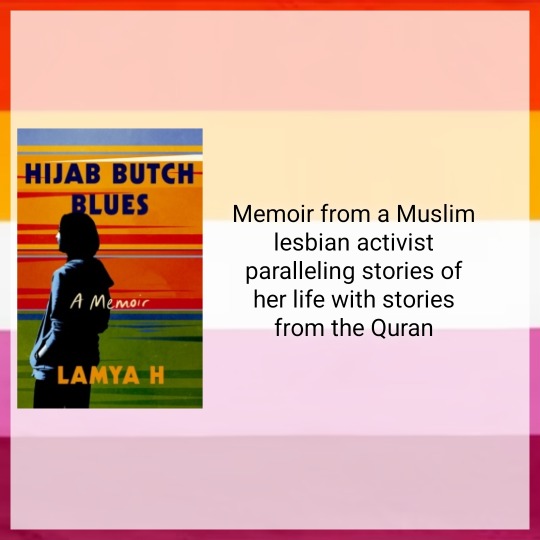




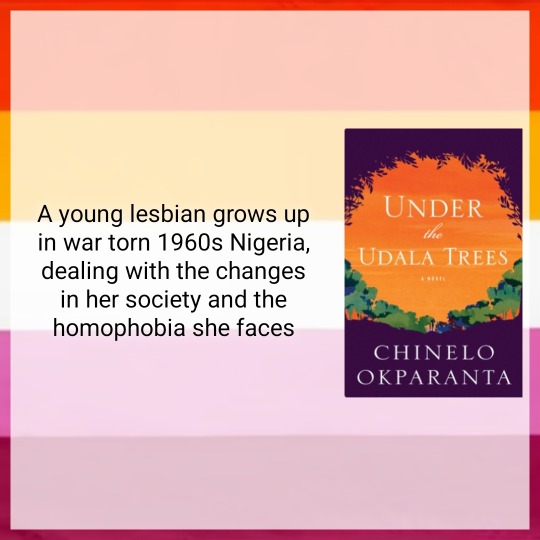
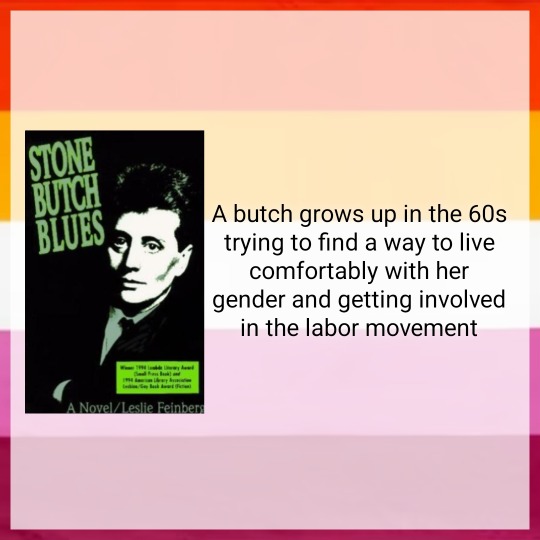
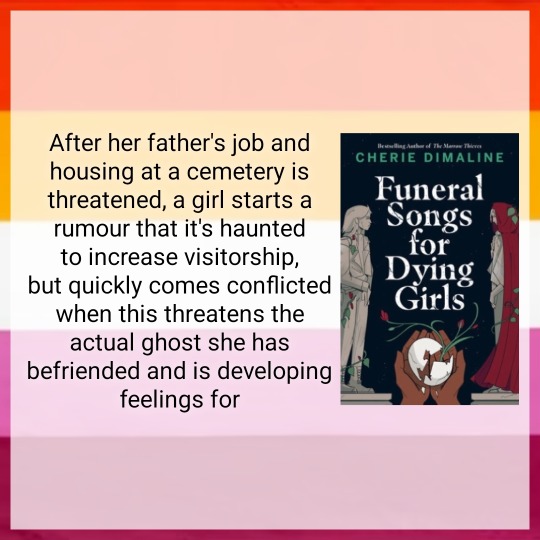

Happy Lesbian Visibility Week! 📚📖🏳️🌈
This does come with the caveat that I can't quite remember if the characters in How to Find a Princess, Funeral Songs for Dying Girls, and Chain-Gang All-Stars identity specifically as lesbians or not, but they are all sapphic. Full titles under the cut!
Hijab Butch Blues by Lamya H
In the Dream House by Carmen Maria Machado
How to Find a Princess by Alyssa Cole
Cantoras by Carolina De Robertis
The Color Purple by Alice Walker
Under the Udala Trees by Chinelo Okparanta
Stone Butch Blues by Leslie Feinberg
Funeral Songs for Dying Girls by Cherie Dimaline
Chain-Gang All-Stars by Nana Kwame Adjei-Brenyah
#lesbian#lesbian reads#lesbian books#lesbian lit#queer books#queer reads#queer lit#lesbian visibility week#bookblr#hijab butch blues#in the dream house#how to find a princess#cantoras#the color purple#stone butch blues#funeral songs for dying girls#chain gang all stars
36 notes
·
View notes
Text

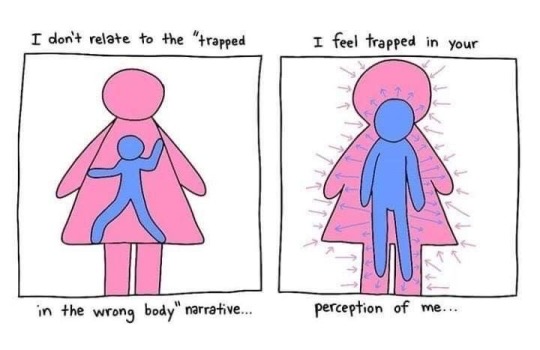


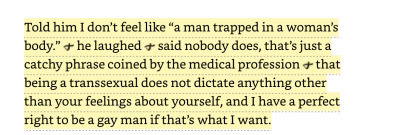


“Trapped”
Stone Butch Blues - Leslie Feinberg
@/lilboyblueish on Instagram
Poem by Keaton St. James (@boykeats)
I/Me/Myself - Will Wood
We Both Laughed In Pleasure by Lou Sullivan
cis people asking cis questions by Silas Denver Melvin (@sweatermuppet)
Tomboy Survival Guide by Ivan Coyote
#we are trapped in what other people see#trans#transgender#transsexual#nonbinary#butch#femme#stone butch blues#leslie feinberg#boykeats#poetry#trans poetry#will wood#lou sullivan#we both laughed in pleasure#silas denver melvin#sweatermuppet#ivan coyote#queer#gay#lgbt#lgbtq#web weaving#parallels
17K notes
·
View notes
Text
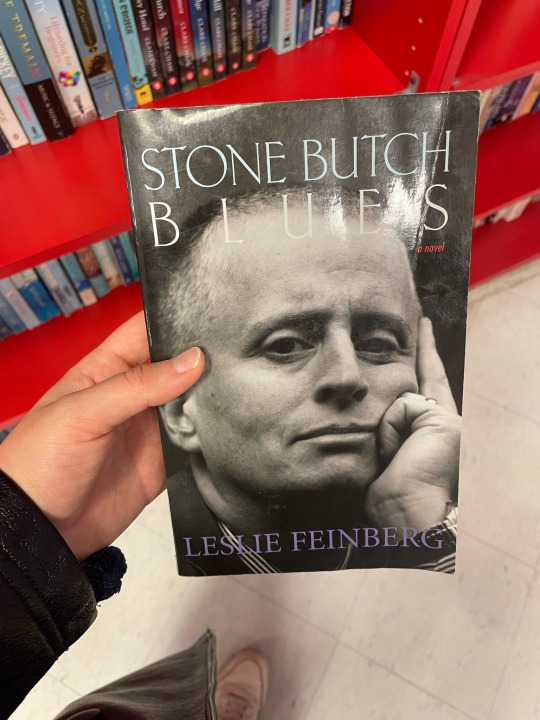

At the thrift and I want to die (in more ways than one)
10K notes
·
View notes
Text
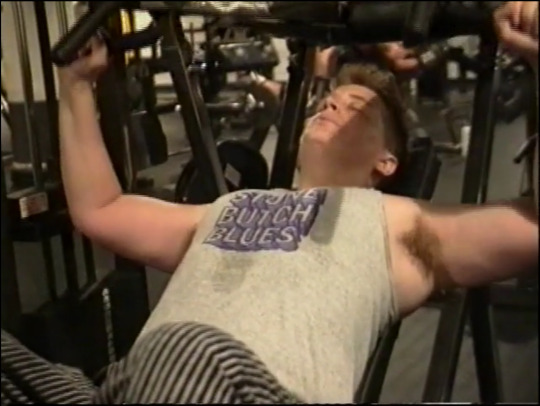


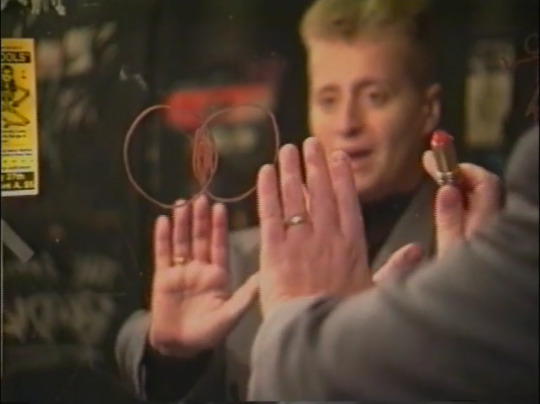
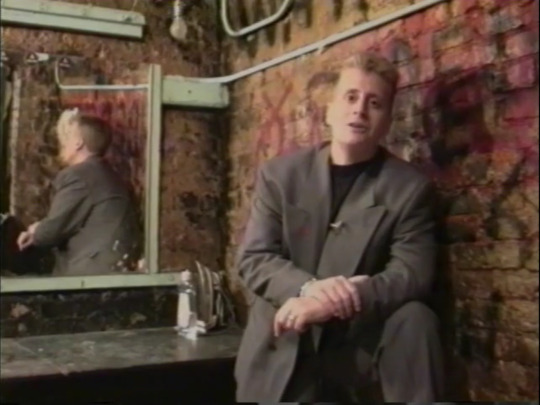

Leslie Feinberg in Outlaw (1994) directed by Alisa Lebow
available now on archive.org!
#Leslie Feinberg#Outlaw#1994#lesbian history#transgender history#mine#stone butch blues#minnie bruce pratt#butch femme
4K notes
·
View notes
Text
“did i survive? i guess i did. but only because i knew i might get home to you.”
—leslie feinberg, stone butch blues
#leslie feinberg#stone butch blues#stone butch lesbian#butch#butch lesbian#lesbian#lesbianism#butchfemme#butchfemme culture#text
704 notes
·
View notes
Text
yeah sure read Stone Butch Blues to understand he/him lesbians but don’t forget the unionizing your workplace part
#its about trans dykery but the communism is rlly the main throughline#stone butch blues#leslie feinberg
11K notes
·
View notes
Text


butchfemme joy is so pure and sacred and special and beautiful and-
i can’t believe those photos exist, it’s like a movie scene
2K notes
·
View notes
Text
“I am typing these words as June 2003 surges with Pride. What year is it now, as you read them? What has been won; what has been lost? I can’t see from here; I can’t predict. But I know this: You are experiencing the impact of what we in the movement take a stand on and fight for today. The present and past are the trajectory of the future. But the arc of history does not bend towards justice automatically—as the great Abolitionist Frederick Douglass observed, without struggle there is no progress . . .”
- Leslie Feinberg
#stone butch blues#leslie feinberg#activism#praxis#social justice#power to the people#workers of the world unite#communism#queer history#queer rights#queer
2K notes
·
View notes
Text


370 notes
·
View notes
Text
Stone Butch Blues links again. Paste this post wherever the fuck you want.
Here is the free official PDF of Stone Butch Blues, by Leslie Feinberg, a nonbinary lesbian.
Here is where you can buy an official physical copy, paying only for the cost of the materials and shipping.
(Edit: Epub now included! Click here!)
As a warning, there are several scenes of police brutality, rape, and some other violence, but they are there to show the affects and reality of oppression, not to be gratuitous or add fake drama.
#Stone Butch Blues#free books#lesbian history#trans history#queer history#LGBT history#nonbinary history
405 notes
·
View notes
Text
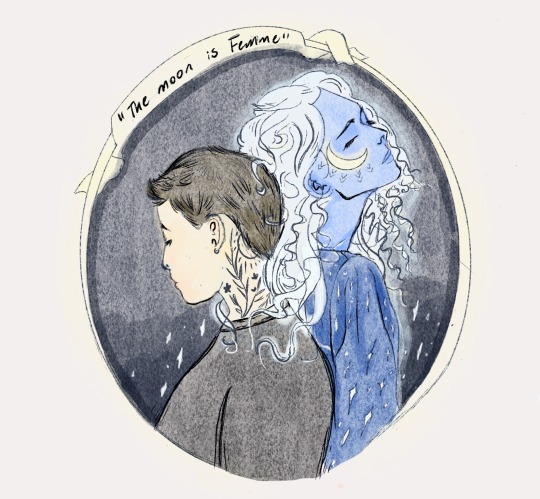
“The moon is femme, child—high-in-the-sky femme—and don’t you forget it,” - Leslie Feinberg, Stone Butch Blues, 1993
#My art#I can’t tell you how relieved and grateful I am to have free time coming up#Stone butch blues#leslie feinberg#Femme#femme lesbian#butch lesbian#butchfemme#butch4femme#femme4butch#queer artist
488 notes
·
View notes
Text
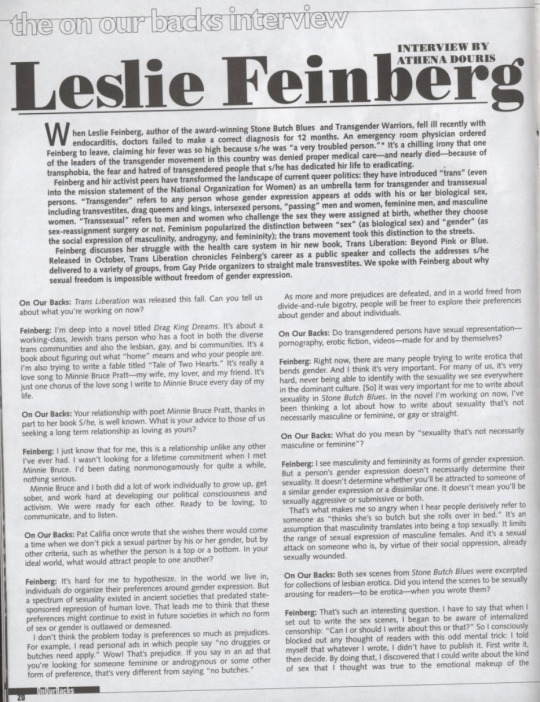
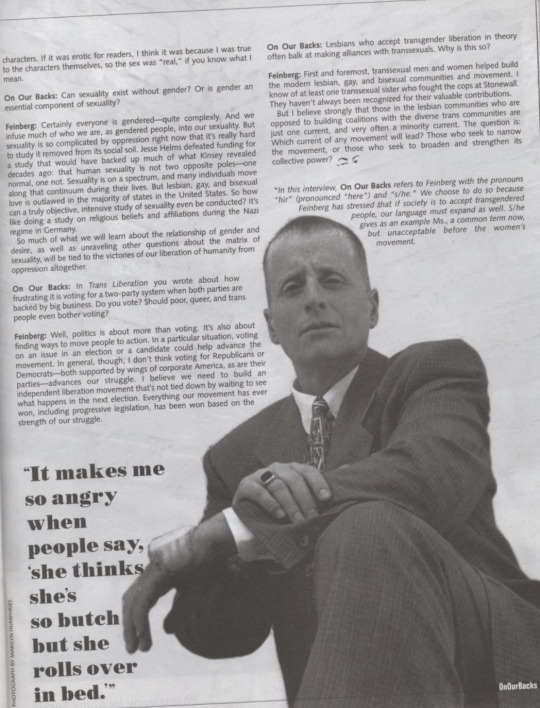
An interview with Leslie Feinberg appearing in the Oct/Nov 1998 issue of On Our Backs.
Please click on image to read or find the transcript below:
Feinberg and hir activist peers have transformed the landscape of current queer politics: they have introduced "trans" (even into the mission statement of the National Organization for Women) as an umbrella term for transgender and transsexual persons. "Transgender" refers to any person whose gender expression appears at odds with his or ber biological sex, including transvestites, drag queens and kings, intersexed persons, "passing" men and women, feminine men, and masculine women. "Transsexual" refers to men and women who challenge the sex they were assigned at birth, whether they choose sex-reassignment surgery or not. Feminism popularized the distinction between "sex" (as biological sex) and "gender" (as the social expression of masculinity, androgyny, and femininity); the trans movement took this distinction to the streets.
Feinberg and hir activist peers have transformed the landscape of current queer politics: they have introduced "trans" (even into the mission statement of the National Organization for Women) as an umbrella term for transgender and transsexual persons. "Transgender" refers to any person whose gender expression appears at odds with his or ber biological sex, including transvestites, drag queens and kings, intersexed persons, "passing" men and women, feminine men, and masculine women. "Transsexual" refers to men and women who challenge the sex they were assigned at birth, whether they choose sex-reassignment surgery or not. Feminism popularized the distinction between "sex" (as biological sex) and "gender" (as the social expression of masculinity, androgyny, and femininity); the trans movement took this distinction to the streets.
Feinberg discusses her struggle with the health care system in hir new book, Trans Liberation: Beyond Pink or Blue. Released in October, Trans Liberation chronicles Feinberg's career as a public speaker and collects the addresses s/he delivered to a variety of groups, from Gay Pride organizers to straight male transvestites. We spoke with Feinberg about why sexual freedom is impossible without freedom of gender expression.
On Our Backs: Trans Liberation was released this fall. Can you tell us about what you're working on now?
Feinberg: I'm deep into a novel titled Drag King Dreams. It's about a working-class, Jewish trans person who has a foot in both the diverse trans communities and also the lesbian, gay, and bi communities. It's a book about figuring out what "home" means and who your people are. I'm also trying to write a fable titled "Tale of Two Hearts." it's really a love song to Minnie Bruce Pratt-my wife, my lover, and my friend. It's just one chorus of the love song I write to Minnie Bruce every day of my life.
On Our Backs: Your relationship with poet Minnie Bruce Pratt, thanks in part to her book S/he, is well known. What is your advice to those of us seeking a long term relationship as loving as yours?
Feinberg: I just know that for me, this is a relationship unlike any other I've ever had. I wasn't looking for a lifetime commitment when I met Minnie Bruce. I°d been dating nonmonogamously for quite a while, nothing serious. Minnie Bruce and I both did a lot of work individually to grow up, get sober and work hard at developing our political consciousness and activism. We were ready for each other. Ready to be loving, to communicate, and to listen.
On Our Backs: Pat Califia once wrote that she wishes there would come a time when we don't pick a sexual partner by his or her gender, but by other criteria, such as whether the person is a top or a bottom. In your ideal world, what would attract people to one another?
Feinberg: It's hard for me to hypothesize. In the world we live in, individuals do organize their preferences around gender expression. But a spectrum of sexuality existed in ancient societies that predated state. sponsored repression of human love. That leads me to think that these preferences might continue to exist in future societies in which no form of sex or gender is outlawed or demeaned. I don't think the problem today is preferences so much as prejudices. For example, I read personal ads in which people say "no druggies or butches need apply." Wow! That's preiudice. If you say in an ad that you're looking for someone feminine or androgynous or some other form of preference. that's very different from saving "no butches." As more and more prejudices are defeated, and in a world freed from divide-and-rule bigotry, people will be freer to explore their preferences about gender and about individuals.
On Our Backs: Do transgendered persons have sexual representation-pornography, erotic fiction, videos made for and by themselves?
Feinberg: Right now, there are many people trying to write erotica that bends gender. And I think it's very important. For many of us, it's very hard, never being able to identify with the sexuality we see everywhere in the dominant culture. [So] it was very important for me to write about sexuality in Stone Butch Blues. In the novel I'm working on now, I've been thinking a lot about how to write about sexuality that's not necessarily masculine or feminine, or gay or straight.
On Our Backs: What do you mean by "sexuality that's not necessarily masculine or feminine"?
Feinberg: I see masculinity and femininity as forms of gender expression. But a person's gender expression doesn't necessarily determine their sexuality. It doesn't determine whether you'll be attracted to someone of a similar gender expression or a dissimilar one. It doesn't mean you'll be sexually aggressive or submissive or both. That's what makes me so angry when I hear people derisively refer to someone as "thinks she's so butch but she rolls over in bed." It's an assumption that masculinity translates into being a top sexually. It limits the range of sexual expression of masculine females. And it's a sexual attack on someone who is, by virtue of their social oppression, already sexually wounded.
On Our Backs: Both sex scenes from Stone Butch Blues were excerpted for collections of lesbian erotica. Did you intend the scenes to be sexually arousing for readers - to be erotica - when you wrote them?
Feinberg: That's such an interesting question. I have to say that when I set out to write the sex scenes, I began to be aware of internalized censorship: "Can I or should I write about this or that?" So I consciously blocked out any thought of readers with this odd mental trick: I told myself that whatever I wrote, I didn't have to publish it. First write it, then decide. By doing that, I discovered that I could write about the kind of sex that i thought was true to the emotional makeup of the characters. If it was erotic for readers, I think it was because I was true to the characters themselves, so the sex was "real," if you know what I mean.
On Our Backs: Can sexuality exist without gender? Or is gender an essential component of sexuality?
Feinberg: Certainly everyone is gendered - quite complexly. And we infuse much of who we are, as gendered people, into our sexuality. But sexuality is so complicated by oppression right now that it's really hard to study it removed from its social soil. Jesse Helms defeated funding for a study that would have backed up much of what Kinsey revealed decades ago: that human sexuality is not two opposite poles- one normal, one not. Sexuality is on a spectrum, and many individuals move along that continuum during their lives. But lesbian, gay, and bisexual love is outlawed in the majority of states in the United States. So how can a truly objective, intensive study of sexuality even be conducted? It's like doing a study on religious beliefs and affiliations during the Nazi regime in Germany. So much of what we will learn about the relationship of gender and desire, as well as unraveling other questions about the matrix of sexuality, will be tied to the victories of our liberation of humanity from oppression altogether.
On Our Backs: In Trans Liberation you wrote about how frustrating it is voting for a two-party system when both parties are backed by big business. Do you vote? Should poor, queer, and trans people even bother voting?
Feinberg: Well, politics is about more than voting. It's also about finding ways to move people to action. In a particular situation, voting on an issue in an election or a candidate could help advance the movement. In general, though, I don't think voting for Republicans or Democrats - both supported by wings of corporate America, as are their parties - advances our struggle. I believe we need to build an independent liberation movement that's not tied down by waiting to see what happens in the next election. Everything our movement has ever won, including progressive legislation, has been won based on the strength of our struggle.
On Our Backs: Lesbians who accept transgender liberation in theory often balk at making alliances with transsexuals. Why is this so?
Feinberg: First and foremost, transsexual men and women helped build the modern lesbian, gay, and bisexual communities and movement. I know of at least one transsexual sister who fought the cops at Stonewall. They haven't always been recognized for their valuable contributions. But I believe strongly that those in the lesbian communities who are opposed to building coalitions with the diverse trans communities are just one current, and very often a minority current. The question is: Which current of any movement will lead? Those who seek to narrow the movement, or those who seek to broaden and strengthen its collective power?
*In this interview, On Our Backs refers to Feinberg with the pronouns "hir" (pronounced "here") and "s/he." We choose to do so because Feinberg has stressed that if society is to accept transgendered people, our language must expand as well. S/he gives as an example Ms., a common term now, but unacceptable before the women's movement.
Source.
2K notes
·
View notes
Text

Stone Butch Blues heals the hurt inside me.
For the boys that are too gay to be guys, for the lesbians that aren't feminine enough to be on television, for the weirdos that never became women, and for our sexy stones...
You aren't alone! 🌈
#stone butch blues#pride#nonbinary lesbian#lesbian#butch#lesboy#nonbinary#genderqueer#aroace#stone butch#stone#lesbian pride#lgbt#my art#daly art
1K notes
·
View notes
Text
Reading the Bible (stone butch blues)
#stone butch blues#lesbian#I need to finish it this pride month#it’s a need#butch4femme#butch positivity#butch#butch femme#femme4butch#femme#leslie feinberg
862 notes
·
View notes
Text
part of why I love stone butch blues is hugely contributed to the fact that the butches experience a full range of emotions. They cry, they blush, they feel weakness so obviously but are so undoubtedly strong. They laugh and are nervous and don't always know what to do, sometimes they do shit wrong, sometimes they're embarrassing. They're warm and sweet and it's incredible because like people get the idea that butch is rigid, just a tough face, only competency, only stoic. When in like real life every butch I love is so fucking silly and open and joking and emotional and this does not at all detract from but in fact instills their strength in my mind. Butches laugh through the hardest shit, offer you their support when they're already limping.
I wish I knew all that when I was younger and trying to be tough about everything because that's all I knew. That's all any of the dykes I knew who were my age knew and we rubbed together like stone on stone, sometimes doing damage when it wasn't necessary. We scraped each other into points but couldn't control where we aimed.
I don't regret a second of it, because they all taught me something and there's always gonna be a piece of me that loves tough love because feelings are complicated that way. But I'm really glad I grew up and realized I don't have to be tough to be strong and I hope others do, too.
2K notes
·
View notes
Text
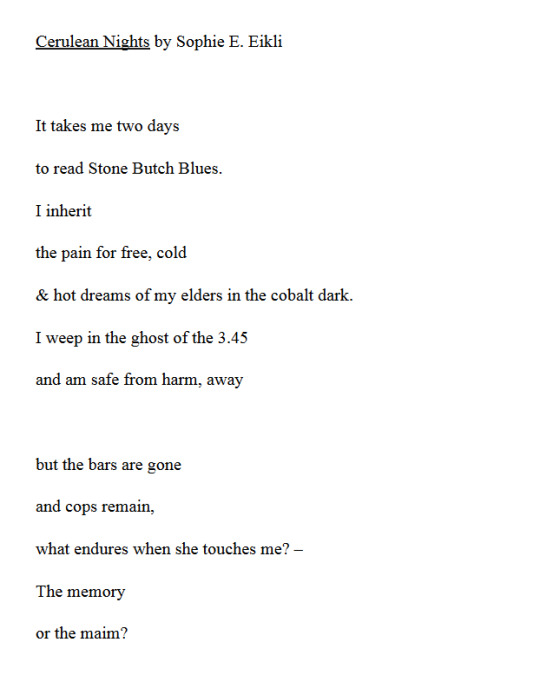
Cerulean Nights by Sophie E. Eikli, originally published in the first edition of Beloved Zine. Image ID in image description.
#my poetry#poetry#lesbian#leslie feinberg#stone butch blues#queer history#lgbt history#lesbianism#my words
398 notes
·
View notes